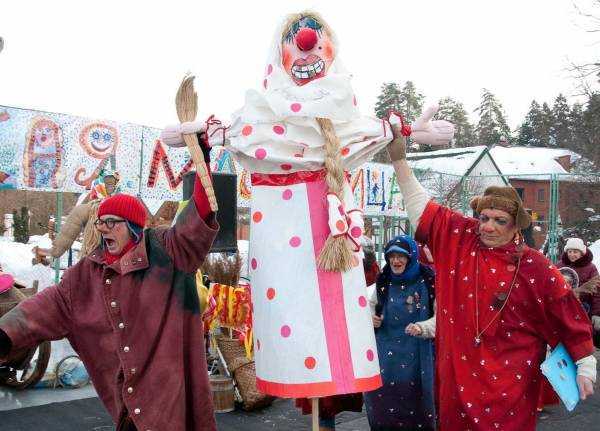
Maslenitsa week in Russia in 2019 will be held from March 4 to 10. In the capital, the gastronomic festival "Moscow Maslenitsa" opened on March 1, it will be held at 23 city venues. Its guests will be able to try pancakes made according to old recipes, delicacies from game and fish, and other food. A similar festival last year was attended by almost 5 million people.
Festive celebrations with pancake eating and burning of Maslenitsa effigies will also take place in many other cities in Russia. The most unusual option will be offered to guests of the Nikola-Lenivets art park in the Dzerzhinsky district of the Kaluga region. There, they will burn a 20-meter tower made of hay and vines, created based on the Bastille fortress that became famous during the Great French Revolution.
Where Russians will celebrate Maslenitsa
"This year, Maslenitsa festivities are offered by both Krasnaya Polyana and large hotels and resorts in Sochi and Crimea, such as Yalta-Intourist. Trips on Maslenitsa dates coincide with the upcoming holiday on March 8, so they are in demand," the press service of the Intourist tour operator reported.
The company added that they also see an increase in the number of applications for tours to St. Petersburg – but this is more due to the three days off than to the celebration of Maslenitsa. “Rather, the matter is that young people want to give a romantic trip to the Northern capital with its embankments and palaces to beautiful ladies,” the press service noted.
Tour operator Multitour has high demand for tours around the Golden Ring during Maslenitsa.
"Maslenitsa festivities will be held in Suzdal, Yaroslavl, Kostroma, Pereslavl-Zalessky, Uglich, Myshkin, Martynovo - on the main squares of the cities and on the territory of museums. Closed festive events will be organized for guests in hotels," Irina Gormakova, General Director of the Multitour Group of Companies, told the Interfax-Tourism portal.
She added that this year the company offered tourists to celebrate Maslenitsa in Veliky Ustyug with Father Frost. "However, the demand for this destination is somewhat lower compared to the Golden Ring. Veliky Ustyug is primarily associated with the New Year for tourists, and the tour also includes additional expenses in the form of train tickets," I. Gormakova noted.
Moscow and Moscow region
Despite the gastronomic festival "Moscow Maslenitsa", tourists are in no hurry to book tours to the capital.
"For foreign tourists, Maslenitsa is not yet as well-known a tourist product as the Journey to Christmas festival, which has already become a brand and attracts travelers. We do not offer special trips to Maslenitsa yet, but we will tell tourists who will be in Moscow on these dates about the holiday," Intourist said.
The company "Multitur" noted that there is no increased demand for tours to Moscow due to Maslenitsa. "Tourists associate Maslenitsa primarily with Russian flavor. There is an increase in the flow to Moscow and St. Petersburg for the period March 8-10, but this is due to the extended weekends," said I. Gormakova.
The press service of the Atelika hotel chain also noted that the Atelika Lipki hotel in the Moscow region is in high demand for holiday weekend stays.
"This year we offered a themed tour from March 7 to 10 on the theme of International Women's Day and Maslenitsa festivities, it is in demand. Residents of Moscow, the Moscow region and nearby cities come to us consistently well," the company reported.
Maslenitsa is a traditional holiday of the Eastern Slavs, which is celebrated during the week before Lent. The date of Maslenitsa changes every year depending on the date of Easter. The main traditional attributes of the folk celebration are the burning of the Maslenitsa effigy as a sign of farewell to winter, festivities, sleigh rides, pancakes and flatbreads, and among Belarusians and Ukrainians also vareniki, syrniki and kolodka. The most popular part of the Maslenitsa ritual is eating pancakes, symbolizing the sun and the coming of spring.
Source: tourism.interfax.ru

